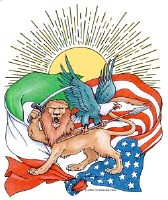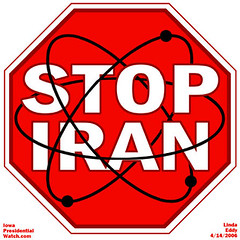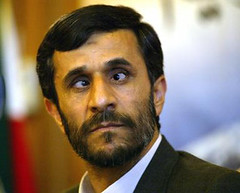Reuters: "A South Korean ship classification society on Thursday sidestepped calls from a U.S. lobby group to halt its verification work in Iran, saying it was concerned that vessel safety and marine environment protection could be compromised by political issues. Without verification from such bodies, ships are unable to call at international ports. U.S. group United Against Nuclear Iran (UANI) last week urged the Korean Register of Shipping (KR) to stop providing classification and certification services to the Islamic Republic of Iran Shipping Lines (IRISL), its front companies and the National Iranian Tanker Company (NITC). It had described KR's approach as 'irresponsible.' ... The spokesman with UANI, which seeks to stop Iran's nuclear ambitions, said EU and U.S. sanctions 'will work best when non-Western classification societies join the cause instead of providing the regime with loopholes.' 'It is rather disingenuous to portray business with Iran as an exercise in public safety, given how many companies and individuals stand to profit from it,' the UANI spokesman said. 'It is impossible for a shipping company to safely do business with Iran, given the regime's well known history of deception, falsified cargoes, and shipments to and from terrorists.'" http://t.uani.com/MNl3kz
AP: "Both sides benefited from a meeting of technical experts from Iran and six world powers focused on proposals to end the standoff over Tehran's controversial nuclear program, but the talks will not necessarily contribute to resolving the stalemate, diplomats said Thursday. Speaking a day after the end of the Istanbul meeting, two diplomats familiar with the talks were at pains to emphasize they were not negotiations meant to overcome divisions that have stymied recent high-level talks. Instead, they said, experts went into the technical nitty-gritty of what each side was bringing to the table at the more senior meetings. They said it was now up to officials at those higher levels to decide whether that more detailed knowledge could serve as the springboard for a new attempt to resolve differences." http://t.uani.com/ObJXpZ
Reuters: "Iran's announcement that it plans to build its first nuclear-powered submarine is stoking speculation it could serve as a pretext for the Islamic state to produce highly enriched uranium and move closer to potential atom bomb material. Western experts doubt that Iran - which is under a U.N. arms embargo - has the capability any time soon to make the kind of sophisticated underwater vessel that only the world's most powerful states currently have. But they say Iran could use the plan to justify more sensitive atomic activity, because nuclear submarines can be fuelled by uranium refined to a level that would also be suitable for the explosive core of a nuclear warhead. 'Such submarines often use HEU (highly enriched uranium),' former chief U.N. nuclear inspector Olli Heinonen said, adding Iran was unlikely to be able source the fuel abroad because of the international dispute over its nuclear programme. It could then 'cite the lack of foreign fuel suppliers as further justification for continuing on its uranium enrichment path', Heinonen, now at Harvard University's Belfer Center for Science and International Affairs, said." http://t.uani.com/M8h39Z

Nuclear Program
Reuters: "Iran and the United States might be talking up their readiness for war in the Gulf but beneath the rhetoric, all sides are appear keen to avoid conflict and prevent accidental escalation - at least for now. This week, a string of hawkish Iranian statements - including a renewed threat to close the Strait of Hormuz and destroy U.S. bases 'within minutes' of an attack - helped push benchmark Brent crude oil prices above $100 for the first time since June. Western military officials and analysts say Tehran does have the capability to wreak regional havoc. But the current saber-rattling, they believe, is more about moving markets and trying to give the West second thoughts over the ever-tightening oil sanctions aimed at cutting back Tehran's nuclear programme." http://t.uani.com/N27YAh
JPost: "Bombing Iran is not the stupidest idea Meir Dagan has heard after all, the former Mossad head made clear in an interview in the recent issue of Lochem magazine, distancing himself from his statement earlier this year - which was widely circulated to discredit a possible Israeli military action against Tehran. 'This was a miserable quote that was said absentmindedly, not in public, and which someone quotes all the time,' Dagan said in the magazine for disabled IDF veterans. 'Let's set the record straight. I think the Iranian nuclear capacity is a threat with strategic implications for Israel. I know the air force well enough to know that it will perform successfully any task entrusted to it.' While stepping away from that particular quote, Dagan did not however move away from the substance of his opposition to military action. 'I do see a nuclear Iran as a problem,' he said. 'If I believed that a military attack would solve the problem, believe me, I would be in favor.'" http://t.uani.com/NbM2Vw
Sanctions
Reuters: "India's oil imports from Iran fell 18.2 percent in June from a year earlier in a third straight monthly decline, although the pace slowed as refiners built stocks ahead of Western sanctions against Tehran's nuclear programme that took effect by July... State-run Mangalore Refinery and Petrochemicals Ltd was the biggest Indian client of Iran in June, shipping in 160,000 bpd, a jump of more than 270 percent from May and about 40 percent from a year ago. June volumes are higher as MRPL took delayed delivery of its cargoes scheduled for May, when its refinery was shut. MRPL's annual imports from Iran between January and June declined about 38 percent to 93,800 bpd. In the January-June period, Essar Oil was the top Indian client of Tehran, buying 126,900 bpd of oil, nearly 25 percent more than a year ago. Essar, which raised Iranian imports in the January-March period to stock up and meet last fiscal year's commitments, bought about 116,300 bpd in June, a significant rise from about 33,000 bpd in May." http://t.uani.com/M9WgEG
Bloomberg: "India is using euros to clear most of its purchases of Iranian oil through a Turkish bank because of hurdles in making rupee payments, according to three people with knowledge of the transactions. While some payments have been made in rupees, they are more difficult after India barred Tehran-based Parsian Bank from opening a branch in Mumbai and because the rupee can't be directly converted overseas to other currencies, the people said, asking not to be identified because the information is confidential. The euro payments are continuing even as the U.S. and the European Union seek to limit oil revenue in Iran, which they say is developing nuclear weapons. The payments also mean Iran won't be handicapped by difficulties in converting rupees, the worst performer among Asian currencies over the past 12 months." http://t.uani.com/LBjzGk
Ottawa Citizen: "A major Canadian bank has begun to close the accounts of some of its customers to comply with new federal regulations that govern economic sanctions against Iran. TD Bank Group has confirmed it has been sending letters to clients telling them under recent changes to the Special Economic Measures (Iran) Regulation, Canadian financial institutions are forbidden from providing financial services to anyone in Iran or for the benefit of Iran. That appears to include any use of an account to send or receive money via wire transfer to or from friends and family in Iran. So far, it seems no other Canadian bank has taken similar action, but TD Bank Group spokesperson Mohammed Nakhooda said the bank is simply following regulations set out by the Canadian government." http://t.uani.com/PhEKSv
Foreign Affairs
Haaretz: "The time has come for the disappearance of Israel and the West from the face of the universe, a senior Iranian official was quoted as saying on Thursday, saying that they were the 'prime sources of tyranny and gloom.' ... Speaking at a Tehran conference, Larijani was cited by Iran's Press TV as saying that 'the time has come for the disappearance of the West and the Zionist regime - which are two dark spots in the present era - from the face of the universe.' 'The U.S. and the Zionist regime are the prime sources of tyranny and gloom in the current age. The Muslim world is fed up with the injustice and abuse by these governments,' Larijani added." http://t.uani.com/M9okYx
AP: "Iran says it has invited Egypt's new Islamist president to Tehran for a summit meeting of the Non-Aligned Movement in August. Iranian President Mahmoud Ahmadinejad said he talked to Egypt's president, Mohammed Morsi, and offered the invitation, according to Ahmadinejad's website. Morsi is the first Islamist president of Egypt and the first to be democratically elected. Egyptian officials were not available for comment Thursday. Egypt is the current chair of the Non-Aligned Movement and is due to turn over the position to Iran at the summit." http://t.uani.com/N36fMK
AP: "Iran's spy chief is accusing French and German intelligence services of cooperating with the CIA to kill Iranian nuclear scientists. Heidar Moslehi said Friday that intelligence services in the region have also taken part in the campaign. He did not name other countries. In the past, Iran has blamed the U.S., Britain and Israel over the killing of five nuclear scientists. The last assassination was in January. The U.S. and Britain have denied involvement. Israel has not commented." http://t.uani.com/NHdvuA
Opinion & Analysis
Chicago Tribune Editorial Board: "The tighter trade sanctions recently imposed on Iran ought to be the ultimate test of whether economic pressure can be painful enough to force an undemocratic government to give up the quest for nuclear weapons. We say 'ought to be' because this effort falls way short of an ultimate test. Too many countries just aren't ready to make it a critical priority. The Obama administration has made much of its program to sap Tehran's economic vitality, and it is an ambitious plan. The European Union has established an embargo on Iranian oil imports, and under a new U.S. law, foreign banks have to stop doing business with Iran's central bank in order to maintain access to American financial institutions. Iran has seen its oil exports drop to 1.5 million barrels a day, down from 2.5 million last year. 'We're going directly at their revenue and making it increasingly difficult for them to access that revenue,' Treasury Department official David S. Cohen told The New York Times. But considerably less difficult than it could be. Not everyone is strongly resolved to punish the Iranian regime for its dangerous ambitions, and Washington has cut some countries a lot of slack. It has granted exemptions to no fewer than 20 nations that buy Iranian oil - including China, Japan and India, which are Iran's three biggest customers. Ten members of the EU also qualified. How did they manage to get a pass? The U.S. law permits such accommodation for countries that have 'significantly reduced' their purchase of Iranian oil. And 'significant,' as defined by the State Department, may be a synonym for 'not much.'" http://t.uani.com/N9NWT1
Meghan O'Sullivan in LAT: "The latest Iran sanctions came into full effect this week, adding to a byzantine array of unilateral and multilateral measures that prohibit Iranian oil imports, other trade and financial transactions, and freeze Iranian assets by countries concerned that Tehran's nuclear program is intended for military purposes, not civilian ones. The international community is now on watch for cracks in Iran's defiant stance: Will increased sanctions compel Tehran to make real concessions and allow for a diplomatic solution to the standoff? This characterization is too simplistic, however, and the record suggests there may be some reasons to be optimistic that current sanctions on Iran will deliver. Sanctions generally get a bad rap, with many declaring that they don't work. First, sanctions against Iran are today just one tool in a larger strategy. In other cases - in South Africa, Serbia and Libya, for example - where sanctions have worked, they were not stand-alone instruments. In past decades, sanctions against Iran have constituted the entirety of the U.S.-led strategy against Tehran's nuclear ambitions. Today, in contrast, the U.S. approach involves not only sanctions but also diplomatic talks, and at least some threat of military force. Perhaps more important, sanctions against Iran have already had a real economic impact. Some reports assess that Iranian oil imports have dropped by as much as 1 million barrels a day since the end of 2011. This puts pressure on Iran's budget, nearly 70% of which is funded by oil revenue. Moreover, the value of the Iranian rial has dropped dramatically since September 2011 on account of Iran's growing isolation from the international banking system and the need to resort to barter arrangements. As a result, inflation is on the rise. But the real test of sanctions is not whether they are part of a nicely crafted strategy, or whether they create economic hardship, but whether they induce a change in the behavior of Tehran's leaders. Anticipating whether the pain from sanctions is sufficient to force this shift is always difficult, and even more so in a country like Iran where decision-making is opaque. After all, leaders from every country will insist they are impervious to the pressure - right up until the moment they make the sought-after concession." http://t.uani.com/L4P7HN
Omid Memarian in The Daily Beast: "Is it myth or reality that Iranians support the government's policy of pursuing the enrichment of uranium that has brought the country severe sanctions and international isolation? In a country where the state controls all means of communications, and where anybody who challenges the state's official narrative faces persecution, that's not easy to find out. But citizens' responses to a survey that appeared on the website of Iran's state TV on Tuesday might be revealing. Sixty-three percent of users said they favor suspending Iran's uranium enrichment in exchange for a gradual lifting of international sanctions against Iran. Those results were registered by 8:30 p.m. Tehran time Tuesday. There was no estimate for the number of respondents. Participants were offered three possible responses when asked, 'What method do you prefer vis-à-vis the unilateral sanctions imposed against Iran by the West.' Aside from the 62 percent who favored suspension of enrichment, 19 percent chose 'Retaliatory action by Iran to close the Hormuz Strait,' while 18 percent chose 'Resistance against the unilateral sanctions in order to maintain the nuclear rights.' This survey was published one day after Ebrahim Agha Mohammadi, a member of the Iranian Parliament's National Security and Foreign Policy Commission, presented a bill to Parliament urging that members 'block the Hormuz Strait in response to the sanctions by West.' Such a measure would be a radical, highly confrontational response to sanctions. No action has yet been taken by lawmakers... 'Americans are told they have an inalienable right to life, liberty, and the pursuit of happiness,' Karim Sadjadpour, Iran analyst at the Carnegie Endowment for International Peace, told The Daily Beast. 'Iranians are deprived freedom, but told that they have an inalienable right to enrich uranium. You can only insult your population's intelligence for so long.' ... 'The economic well-being of the Iranian people has never been a top-tier priority of the Iranian regime,' said Sadjadpour. 'The colossal domestic and foreign-policy mismanagement during the Ahmadinejad era has been a far greater contributor to Iran's economic malaise than sanctions.' ... 'For 10 years now the Iranian government has been touting its nuclear program as a technological and economic crown jewel. Given that life has gotten harder for most Iranians during this period, it's only natural that people are questioning whether it's worth the enormous costs they're enduring,' said Sadjadpour." http://t.uani.com/NbM2Vw
Julian Borger in The Guardian: "The official talks between Iran and six major powers continue to creep forward with no sign of progress. Technical experts met in Istanbul on Tuesday to thrash out the science involved in the negotiations, but the rift between the two sides is wide and essentially political. The next step is supposed to be a meeting between mid-level diplomats - the deputy EU foreign policy representative, Helga Schmid, and her Iranian counterpart, Ali Bagheri, more to keep the conversation going than in any genuine sense of forward movement. Meanwhile, the fullest exposition of the Iranian position to date has surfaced in the form of a document presented at the Iranian mission to the UN on Tuesday to a group of US nuclear experts, at the same time as the Istanbul meeting. The document, which was first reported by Al-Monitor, appears to be a paper version of the PowerPoint presentation given by the Iranian delegation to the Moscow talks last month, and it is a tough read. It comprehensively rejects the EU-brokered proposal for Iran to stop production of 20%-enriched uranium, to shut down production at the underground Fordow centrifuge plant, and ship out Iran's stockpile of 20% uranium ('stop, shut and ship'), in return for fuel plates for a medical research reactor, nuclear safety assistance, and parts for commercial airliners. The document states that Iran needs its 20% uranium not just for the Tehran Research Reactor (TRR) but 'for at least 4 other research reactors because of the territorial extent of Iran and the short lifetime of medical isotopes'. It also suggested that Tehran might want to sell its nuclear fuel abroad, another rationale for producing more than it currently needs. The New York document also says that shutting down Fordow 'has no relation to 20%' because other activities are carried out at the site. It rejects transferring the 20% stockpile out of the country as it says that stockpile is already 'under the supervision of the IAEA, sealed by the IAEA and inspectors of the agency do ... unannounced inspections.' The Iranian presentation makes light of the incentives on offer. It treats the offer of foreign-made fuel plates for the TRR, not as a sweetener for Tehran, but as a favour Iran would be doing the rest of the world, cooperating with the six-power group 'to provide fuel' for the reactor. In return the six powers 'will terminate the sanctions and will remove Iran's nuclear file from the [UN Security Council] agenda.' The document also demands the lifting of sanctions in return for cooperation with the IAEA in its investigation of the 'possible military dimensions' of the Iranian programme, an enquiry Iran insists is grounded on 'baseless accusations and ambiguities'. The central demand is that the six powers openly recognise Iran's right to enrich uranium, in return for which the Islamic Republic would 'emphasise once again ..its commitments under the NPT and its opposition to nuclear weapons based on the Supreme Leader's fatwa against such weapons'. In other words, iran wants the international community to allow it's programme go forward without restrictions in return for the Supreme Leader's promise not to make bombs." http://t.uani.com/LCfWA3 |
|










No comments:
Post a Comment